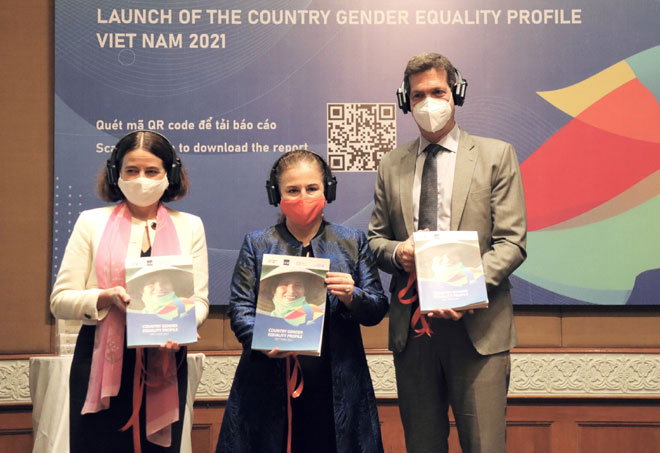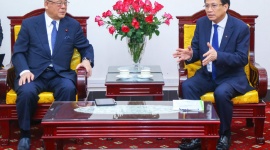New report uncovers Vietnam’s significant progress and barriers to gender equality
(LĐXH)- UN Women and the Australian Embassy in collaboration with ADB and ILO on October 26 launched the flagship report, the “Vietnam country gender equality profile”.

This report is the first-of-its-kind in Vietnam. It takes a broader lens on gender equality to include discussion of gender identity and sexual orientation, and to highlight data relevant to intersectional identity – such as ethnicity, disability and age, etc.
Opening the launching event of the report, Ms. Elisa Fernandez Saenz, Country Representative of UN Women in Vietnam, said “This report’s analysis underlines that gender equality is intrinsic to the very quality, durability, and advances made to Vietnam’s socio-economic development. Therefore, unless progress on gender equality is significantly accelerated, the Sustainable Development Goals cannot be achieved. This is an urgent call for action, and the report recommends the directions to follow”.
Conducted over the course of a year, the Vietnam country gender equality profile (CGEP) represents the collective knowledge, advice, and dedication of many agencies and individuals, combining national and international expertise. This multi-agency effort has identified gender issues and disparities in every sector under examination: governance, labor, agriculture, business, transport and connectivity, urban development, family life, social protection, migration and climate change.
Speaking at the launch, Australia’s Ambassador to Vietnam Robyn Mudie said: “We have invested in this data collection because of a belief in the power of evidence – to stimulate debate, and drive policy, services and opportunities. For Australia, the 16 Key Recommendations describe where we should focus our gender equality partnership with the Government of Vietnam, and where we can support groups who face complex, intersecting disadvantage”.
This report was finalized as Vietnam was responding to its fourth wave of COVID-19 and, unfortunately, sex-disaggregation of the official case numbers are not available. However, unlike previous global public health and financial crises, COVID-19 has been singularly detrimental for women and girls, and has exposed gendered fault lines in the economy and social structures.
The report provides a wide range of recommendations for change, highlighting three key areas of action: (1) Strengthening the implementation of existing gender equality commitments; (2) Addressing the underlying barriers to gender equality; and (3) Driving gender equality progress in the coming decade.
Vietnam country gender equality profile aims to serve as a primary source of evidence to drive the prioritization of financing, programming and advocacy to advance gains and overcome bottlenecks to gender equality in Vietnam. It is intended that the CGEP will also contribute to Vietnam’s monitoring of gender equality-related targets under the UN Sustainable Development Goals./.
Hong Anh
-
 Minister Dao Ngoc Dung received the ASEAN’s General Secretary
24-04-2024 10:38 35
Minister Dao Ngoc Dung received the ASEAN’s General Secretary
24-04-2024 10:38 35 -
 Ha Nam province promotes career orientation for students
23-04-2024 14:28 49
Ha Nam province promotes career orientation for students
23-04-2024 14:28 49 -
 Hundreds of job opportunities for people with disabilities in Hanoi
17-04-2024 10:22 29
Hundreds of job opportunities for people with disabilities in Hanoi
17-04-2024 10:22 29
-
 Minister Dao Ngoc Dung received the Chairman of the Korea International Cooperation Agency
21-03-2024 14:14 48
Minister Dao Ngoc Dung received the Chairman of the Korea International Cooperation Agency
21-03-2024 14:14 48 -
 MoLISA proposing Japan to expand occupations to receive Vietnamese workers
18-03-2024 11:12 55
MoLISA proposing Japan to expand occupations to receive Vietnamese workers
18-03-2024 11:12 55 -
 Promote labour relations between Vietnam and Hungary
18-03-2024 09:55 15
Promote labour relations between Vietnam and Hungary
18-03-2024 09:55 15
English Review


Minister Dao Ngoc Dung received the ASEAN’s General Secretary
English Review | 24-04-2024 10:38 35







